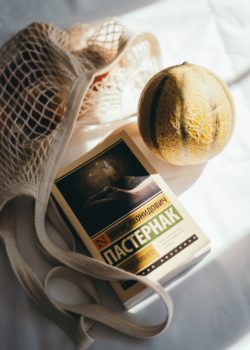V biblioteke (at the library) Posted by bota on Sep 13, 2021 in Culture, language, Literature, Vocabulary
Смо́тришь в кни́гу ви́дишь фи́гу? (Looking into a book but seeing nothing – see note below) That certainly won’t be the case with Transparent’s Library Sign-up month. See here if your local library offers Transparent Language Online so that you can access Russian courses. Remember to read the official rules here and поторопи́тесь — вас ждут призы! (Hurry up — prizes await you!) And while you are at the library, ask if they have any books in Russian (see my recommendation below).
If you are currently in Russia and need a guide on how to navigate Russian libraries, then check out this wonderful post by Maria.
Note:
Смо́тришь в кни́гу ви́дишь фи́гу is a silly phrase Russians say when they are reading something but can’t understand anything. According to Wikipedia’s definition, фи́га is ‘a rude gesture, in which the hand is in the form of a fist with the thumb placed between the index and middle fingers’. It’s usually used to express that you won’t get anything. For example, your friend might make that gesture at you if you ask them for gum and they don’t feel like giving you any. You can see what a ‘фи́га’ is in Jenya’s very informative blog on common Russian gestures (with pictures !). Check it out here.
Now, let’s get nerdy about кни́ги!
First, we have the word кни́га (book). Three of its most common diminutives are кни́жка, кни́жечка, and кни́жица. They all mean “a little book or a cute book”. Книжо́нка can also mean ‘a little book’ but it also implies that the book is not important or that the speaker thinks little of that book . And a person who loves books is a книголюб, applicable as both masculine and feminine (there is no книголюба).
Here are a few famous kinds of books that have similar names in both Russian and English:
Адресная кни́га – address book
Гостева́я кни́га – guest book
Кни́га жа́лоб – book of complaints
Кра́сная кни́га – Red Book
Пова́ренная кни́га – Cookbook
Кни́га Рекордов Ги́ннесса – Guinness Book of Records
And you have probably heard of an adjective кни́жный (кни́жная – feminine, кни́жное – neutral, кни́жные – plural) that’s commonly used в словосочета́ниях с слова́ми ‘сто́лик’ (table), ‘по́лка’ (shelf), ‘шка́ф’ (case), ‘магази́н’ (shop) etc.
Библиоте́ка
You also have noticed that in Russian, along with a bunch of other languages “a library” is библиоте́ка.
Danish – bibliotek
Dutch – bibliotheek
French – bibliothèque
German – Bibliothek
Italian – biblioteca
Norwegian – bibliotek
Portuguese – biblioteca
Spanish – biblioteca
Swedish – bibliotek
In other Slavic languages:
Belarusian – бібліятэка
Polish – biblioteka
Ukrainian — бібліотека
Bulgarian — библиотека
Macedonian — библиотека
Serbo-Croatian – библиотека
Notice how the next three have a different word than библиоте́ка but that it’s closely related to the Russian word ‘кни́га’ (book).
Slovak — knižnica
Czech — knihovna
Slovenian – knjižnica
Finally, this wouldn’t be a proper Library Sign-Up month blog if I didn’t have a Russian book recommendation for you. On the photo above is a delightful book by Boris Leonidovich Pasternak called Doctor Zhivago (Бори́с Леони́дович Пастерна́к, Доктор Живаго). I read the book at the end of high school but haven’t yet seen David Lean’s film based on this Russian literary classic. If you have, let me know in the comments what you thought of the movie or the book.

Build vocabulary, practice pronunciation, and more with Transparent Language Online. Available anytime, anywhere, on any device.







Comments:
David W Roberts:
Dr Zhivago – I saw the film (this word tell you I’m British and not young, so “movie” isn’t in my active vocabulary!) when it first came out, thena gain about a year ago and I have it on video. Excellent! I’ve read the book in English and for the past few years I’ve been planning to read it in Russian (but not got round to it yet). (Is there a Russian equivalent of “not got round to it yet”?)
bota:
@David W Roberts Privet David! Spasibo za vash otvet))) To say “i haven’t got around to it yet” you would say “я до этого ещё не дошёл / я до этого ещё не дошла” (ya do etovo eshe ne doshol / ne doshla) or “я до этого ещё не добрался / я до этого ещё не добралась” (ya do etovo eshe ne dobralsya / ne dobralas’). Literally, it sounds like you physically haven’t reached that place. It’s very interesting that you brought up the ‘film’ vs ‘movie’ difference. I think in the US people tend to use the word ‘film’ preceded by the director’s name, e.g. “David Lean’s highly acclaimed film”. And really, thank you for your comment – I’m definitely putting aside some time to watch Doctor Zhivago this weekend. Would you recommend any other Hollywood adaptations of Russian literary classics? Maybe i should do a separate blog on that….